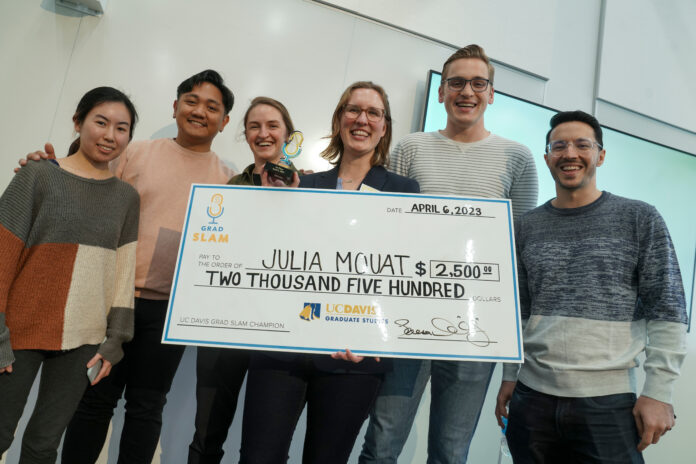The winner and runner up share the inspirations for their research presentations
By JADE BELL — campus@theaggie.org
The semi-final round of the UC Davis Grad Slam competition was held on Thursday, April 6. Participants presented their graduate research to a diverse audience and panel of judges in just three minutes, competing for a chance to win $2,500.
Teresa Dillinger, Ph.D., the director of GradPathways Institute for Professional Development in Graduate Studies, shared that Grad Slam is one of many professional development opportunities during which graduate students can improve their presentation and communication skills.
“Our mission is to prepare all graduate students for success both here at UC Davis and in their chosen career paths,” Dillinger said via email. “To prepare them, we provide programs based on 8 core competencies and one of these is Presentation Skills. We all need to learn to effectively communicate what we do – but for graduate students who spend hundreds of hours on their research, Grad Slam is a challenge because they have to communicate the highlights in just 3 minutes! And they are required to present their research in a way that is compelling and accessible to all audiences.”
Julia Mouat, a fourth-year Ph.D. candidate studying integrative genetics and genomics, did just that with her winning presentation “Grandmas, Ghosts, and Genes.” Mouat shared that her research was an attempt to understand what factors increase the likelihood of autism spectrum disorders.
“Research has shown that grandparental social factors and environmental exposures may increase the risk for autism spectrum disorders in the grandchild,” Mouat said. “[In] particular, grandmaternal cigarette smoking. So, my research is trying to look at the mechanism of how this is happening.”
Mouat’s choice of topic was inspired by why she came to grad school — to integrate genetics with environmental health sciences.
“I have been thinking a lot just about this multigenerational risk and resilience that communities and families go through,” Mouat said. “Families and communities are exposed to high levels of pollution because they live near a power plant or something like that. Or face social factors that increase stress levels or whatever it may beI’. m just really interested in trying to incorporate those factors with biology and how those together interact and influence risk for disease.”
Nalina Aiempichitkijkarn, a fifth-year Ph.D. student studying animal behavior and the second-place winner of the competition, was also interested in the links between disease and animal behavior.
“I am interested in primate social behavior, how they interact among themselves,” Aiempichitkijkarn said. “They live in a big group and they have a social hierarchy. They have friends and some that they don’t like. Sometimes they fight a lot. I want to bring that [and] connect that with infection status because the pilot study shows that 10% of this group have tuberculosis or TB, but we don’t know who are those [that do]. We try to look at their social behavior [and] try to link [that] with the infection status – who are those [that are] infectious.”
Aiempichitkijkarn said that she chose this topic due to her love for animals.
“My first project about animal behavior happened to be monkeys,” Aiempichitkijkarn said. “Since then, I’ve just been into the monkey field. I’m more interested in the social behavior of monkeys and it’s cool when you can link [it] with an aspect that gets some interest from the general public, like an infectious disease diagnosis.”
Both contestants shared that the main challenge they faced during the Grad Slam competition was speaking in terms that the general public can understand while retaining their interest in the presented research.
“It’s a new experience for me to talk to a general audience because I normally talk in my lab group or in an academic setting,” Aiempichitkijkarn said. “So I need to be careful with the word choice I use. With [the] general public it’s a bit different, I try to be correct but in the same way [also] be understandable without any jargon.”
Both participants said that despite the challenges, they enjoyed the competition as well, whether it was chatting with other contestants or learning about each others’ research.
“I really enjoyed meeting all the other contestants,” Mouat said. “Everyone was just friendly, even the photographer, camera people and lights people — they all helped us that day…I thought that the other contestants were there just to have fun and do their best. It didn’t feel like a competitive or toxic environment. It felt really positive and supportive.”
Beyond Grad Slam, Dillinger wants graduate students to know that they are not alone and can receive guidance on their professional and career development concerns.
“We hope that graduate students and postdocs know that the GradPathways Institute in Graduate Studies is here for them to support their professional and career development needs,” Dillinger said via email. “The GradPathways Institute partners with units from across campus to offer hundreds of workshops, consultations, and training throughout the year – all in support of grad student and postdoc success.”
Written by: Jade Bell — campus@theaggie.org










